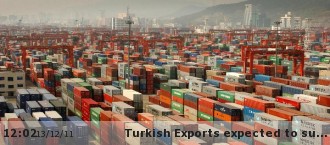 A survey conducted among the 500 leading export and import firms in Turkey has shown that the export sector’s expectations for the future have improved by a large margin as a strong indicator of optimism. According to the Foreign Trade Expectations Survey conducted by the Foreign Trade Undersecretariat (DTM) the Expectation Index both for exports and imports are up for the second quarter of this year. The Export Expectation index has gone up by 20.2 points, while the import expectation index climbed by 15.4 points quarter-on-quarter. Foreign Trade Minister Zafer Çağlayan shared the findings of the survey with the media on Monday in Ankara. According to Çağlayan, the study showed that the first quarter’s export expectation index of 122.7 increased to 142.9 for the second quarter this year. Any value above, below or equal to 100 represents an upward expectation, lower expectation and neutral expectation, respectively. The export expectations for the coming three months of May, June and July, export orders expectations, the current level of registered export orders and the level of export orders in the previous quarter account for the upward value of the index, Çağlayan also said. On a regional basis, in the second quarter of 2011, the export expectations for the Middle East and North Africa (MENA) went down, while the export expectation for all other regions have strongly gone up. “However, the situation in Egypt and Tunisia is going back to normal quickly, and once the situation in Libya is resolved the Turkish investments in this country will rebound strongly, too,” Çağlayan explained. When it comes to target markets, Germany takes the lead in export expectations followed by the US, Russia and France. Çağlayan told the media that the current registered export orders display seasonal normality, which is a sign of a complete recovery from the global crisis. On the other hand, the import expectation index of 113.7 went up to 129.1 in the second quarter of the current year. Import expectations from all regions are up again with the exception of African countries, albeit by a small margin. The survey also questions the problems firms face while trading internationally. The three main problems exporters face that the survey identified are the increase in the price of raw materials and intermediate goods, energy prices and the exchange rate. According to the survey, 72 percent of exporters name the exchange rate as negatively affecting the sector. About 23 percent of importers, on the other hand, said the high value of the exchange rate plays as an incentive to import goods. Çağlayan drew attention to the exchange rate’s impact on the competitiveness of Turkish firms globally, underlining that a high-valued lira makes exports expensive for foreigners. He also stated that the Central Bank of Turkey’s latest policies have contributed to this fact. Commenting on Erdem Başçı, the incoming president of the central bank, Çağlayan says Başçı has grown into a fine economist and deserves the position. He believes that Erdem will focus not only on price stability but also on financial stability as well, taking up where his predecessor, Durmuş Yılmaz, left off. “Focusing on price stability itself is no longer enough,” Çağlayan said.
Effort to reduce foreign dependency a priority Çağlayan said the current government has been working on several issues in order to reduce the foreign dependency of the sectors when it comes to input markets. According to the information he shared with media, his ministry and the Ministry of Agriculture plan to cooperate on increasing the domestic cotton harvest due to higher-than-normal global cotton prices. The textile sector imports close to 1 million tons of cotton a year, at a cost of $5 billion. Çağlayan also mentioned efforts to reduce dependency on pesticides, fertilizers and other chemical products used in the agricultural sector, which are mainly imported. “The import of chemical sector products is another main contributor to the current account deficit [CAD] and we will continue to find solutions in order to address this issue,” he said. Accusing the EU of becoming the most protective trade zone, Çağlayan says the former is setting up high barriers for Turkish goods, not allowing them to move freely in the EU zone. Touching on Turkish investments in Libya, he added that the government is doing everything in its power to help those firms and to protect investments in Libya. “According to the agreement encouraging and protecting investments in both countries that was signed between Libya and Turkey, investments in Libya are under full guarantee of the Libyan government,” Çağlayan says.
|